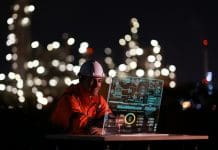Construction industry experts have called on the sector to lead a ‘clean recovery’ from Covid-19, as the pandemic injects a renewed sense of urgency into existing challenges
Construction industry experts – including team members from Willmott Dixon, Colas Group, Innovate UK and NCC – have unanimously called for a ‘clean recovery’ from Covid-19, according to a new report published by Hyperdrive Innovation.
‘An Electric Decade in Construction’ – which includes views from fifteen leading industry experts across Europe – forecasts a rapid growth in demand for cleaner, electric equipment.
The study finds that the Covid-19 pandemic has injected a renewed sense of urgency into existing challenges the industry has faced in recent years, including tightening air pollution legislation, meeting carbon emissions targets and an ever-increasing demand for infrastructure.
Stephen Irish, commercial director of Hyperdrive Innovation, said: “Within the challenges on the industry to clean up its operations, lies a rich opportunity to jump-start the transition to cleaner equipment.
“This report clearly and unequivocally finds that the next decade will be shaped by a rapid transition to cleaner, zero-emission construction equipment. Now is the time for the industry to take a leading role in achieving a more sustainable future.
An electric future
‘An Electric Decade in Construction’ found that the next ten years in the industry will be centred around four key themes.
Key themes include:
- Speed – Delays caused by Covid-19 mean that projects will need to increase productivity to meet deadlines and avoid unwanted additional costs. With electrified equipment considerably quieter than traditional equipment, the number of hours per day where machinery can be used can be extended, enhancing productivity and speeding up construction processes.
- Safety – Covid-19 has also brought a renewed focus on workplace safety within the industry – specifically, the pandemic has shone a spotlight onto the dangers of air pollution. To meet tightening air quality legislation and protect workers and the public against air pollution from construction sites, the industry is looking to move away from noisy, polluting diesel engines and generators and towards cleaner, quieter electrified machinery.
- Sustainability – Building and construction are responsible for 11% of the world’s carbon emissions, making decarbonisation essential. Stricter engine and emissions legislation to meet climate targets is driving the industry away from its reliance on fossil fuels.
- Simplicity – Lower fuel and maintenance costs and being future-proofed against the ever-changing legislative landscape, will drive the construction industry towards simple electrified equipment. The industry also expects an uptick in demand for a ‘modern methods’ approach to construction, using prefabricated, standardised building components developed offsite, to simplify and clean up construction processes.
Building back from Covid-19
As lockdowns ease across the globe, construction will now need to be ramped up to meet the growing demand for infrastructure across Europe.
Mike Pitts, deputy challenge director transforming construction at Innovate UK and contributor to the report, said: ‘‘In the past, the construction industry has been somewhat reluctant to make use of the latest innovations. But this is changing rapidly as the industry is starting to realise the benefits of embracing innovation.
“Times of crisis can often lead to rapid change. Recovery from Covid-19 could accelerate the adoption of technology to help speed up construction processes.”
Stephen Irish added: “Not only is electrified equipment more sustainable but it also has a host of operational benefits, including fuels costs, driver safety and quieter sites.
“Rapid developments in battery technology are making electric equipment cheaper and more efficient, unlocking additional opportunities for construction managers focussing on cleaning up their sites.”














